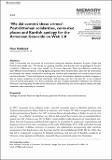Files in this item
‘“We did commit these crimes” : post-Ottoman solidarities, contested places, and Kurdish apology for the Armenian Genocide on Web 2.0
Item metadata
| dc.contributor.author | Halstead, Huw Yiannis | |
| dc.date.accessioned | 2021-07-05T12:30:08Z | |
| dc.date.available | 2021-07-05T12:30:08Z | |
| dc.date.issued | 2021-06 | |
| dc.identifier | 273499797 | |
| dc.identifier | 458e822c-f543-43d8-a321-66ec7df0095f | |
| dc.identifier | 000659176600007 | |
| dc.identifier | 85107548824 | |
| dc.identifier.citation | Halstead , H Y 2021 , ' ‘“We did commit these crimes” : post-Ottoman solidarities, contested places, and Kurdish apology for the Armenian Genocide on Web 2.0 ' , Memory Studies , vol. 14 , no. 3 , pp. 634-649 . https://doi.org/10.1177/17506980211010933 | en |
| dc.identifier.issn | 1750-6980 | |
| dc.identifier.other | ORCID: /0000-0002-8788-4325/work/96141559 | |
| dc.identifier.uri | https://hdl.handle.net/10023/23469 | |
| dc.description.abstract | Web 2.0 facilitates the articulation of transcultural solidarities between Armenian, Assyrian, Greek and Kurdish social media users. This has led to a growing trend for some Kurdish users to apologise for Kurdish complicity in Ottoman crimes, most notably the Armenian Genocide. These post-Ottoman solidarities layer different times and places, creating digital palimpsests where fantasies about place can be constructed, but fantasies that remain connected to enduring and historical place identities and concerns about future territorial borders. These multitemporal montages can foster reconciliation between erstwhile antagonists, lead to mutual recognition of shared victimhood, and perhaps even form the basis for a more inclusive sense of shared (lost) place. Yet, these solidarities can also incubate nationalist irredentism and othering. Moreover, they frequently founder on the very notions of territoriality and exclusive place identity that they sometimes seem ostensibly to transcend. | |
| dc.format.extent | 109955 | |
| dc.language.iso | eng | |
| dc.relation.ispartof | Memory Studies | en |
| dc.subject | Apology | en |
| dc.subject | Armenian Genocide | en |
| dc.subject | Digital memory | en |
| dc.subject | Genocide | en |
| dc.subject | Kurdistan | en |
| dc.subject | Transcultural memory | en |
| dc.subject | HV Social pathology. Social and public welfare | en |
| dc.subject | D501 World War I | en |
| dc.subject | T Technology (General) | en |
| dc.subject | T-NDAS | en |
| dc.subject | SDG 16 - Peace, Justice and Strong Institutions | en |
| dc.subject.lcc | HV | en |
| dc.subject.lcc | D501 | en |
| dc.subject.lcc | T1 | en |
| dc.title | ‘“We did commit these crimes” : post-Ottoman solidarities, contested places, and Kurdish apology for the Armenian Genocide on Web 2.0 | en |
| dc.type | Journal article | en |
| dc.contributor.institution | University of St Andrews. School of History | en |
| dc.identifier.doi | 10.1177/17506980211010933 | |
| dc.description.status | Peer reviewed | en |
This item appears in the following Collection(s)
Items in the St Andrews Research Repository are protected by copyright, with all rights reserved, unless otherwise indicated.

